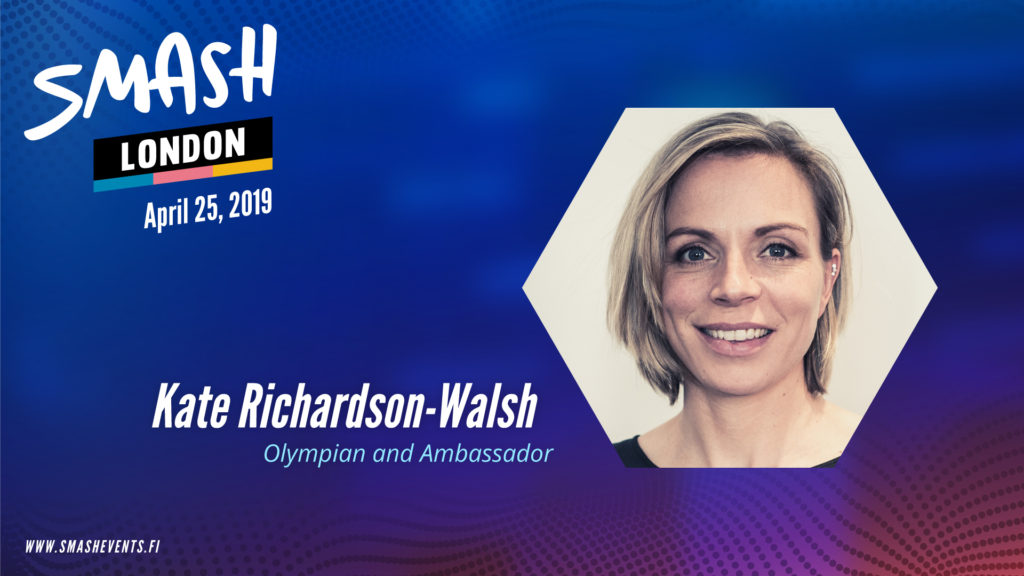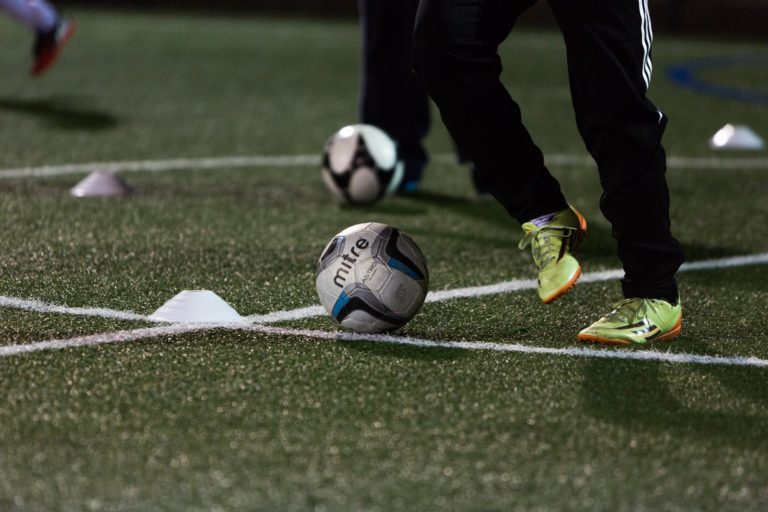The role elite athletes can play in the tech sector will be one of the major discussion points at Smash London tomorrow (25 April).
As a sneak peak ahead of Smash London event, co-host Alex Zurita (London Sport Specialist Advisor Technology for Participation) spoke to Kate Richardson-Walsh OBE about the opportunity and role of athletes within the SportTech ecosystem, how can start-ups work with athletes to achieve social outcomes and her own involvement with Squadkit.
AZ: How do you see elite athletes adding value to start-ups, in particular those using technology for a societal impact?
KRW: In general athletes are hugely passionate about the social impact of sport – having experienced the benefits throughout our lives.
We know that sport can provide amazing friendship groups, can provide direction and drive, teach us how to work with others, how to lead and, importantly, how to relax and escape the pressures of modern life.
In that way we are brilliant advocates for the kind of work that tech start-ups in this space are doing; but we can also bring an in-depth knowledge of the sport ecosystem.
Our networks from grassroots clubs and coaches right through to elite level are extensive, and these kind of connections and introductions can prove invaluable to a start-up trying to create partnerships and markets for itself.
As business associates we can also bring a wide range of valuable skills – we’re team players, we are driven by goals and used to putting strategies in place to achieve results, we’re coachable, ambitious and can provide your brand with credibility.

You work with a school uniform provider called Squadkit, what led you to work with them?
Squadkit align very well with my values and experiences within sport. They supply sports kit to schools and are driven by a desire to keep young people in sport for as long as possible.
At secondary schools we see an alarming rate of drop off for those engaging with sport, particularly amongst girls, and a large part of that is driven by not feeling confident and comfortable in what they are wearing.
Squadkit recognise this and work to provide kit that has the technological design and fit to make young people feel good when they’re playing sport.
For example, they have designed a sports bra from scratch called Limitless that is specifically designed to grow with young girls’ bodies and to provide the support they need throughout school.
It’s a very basic intervention that can make a real difference in whether a girl takes part in a PE lesson or not.
What could the tech ecosystem do to foster further collaboration with athletes?
First of all don’t be afraid to approach an athlete – whether that’s through their social media or through an agent. While we are focused on our training many of us are also looking to develop interests and opportunities outside of competing.
It helps us not to get to obsessed with the day job and once we come to retire having other avenues that we’ve already become involved in can be invaluable to helping us transition out in to the wider world.
We have insight, networks and platforms that are valuable and it’s good sometimes to be reminded of that.
Do be aware though that athletes will need to know what they are getting involved with and what the benefits are for them. We are just like the rest of you and need to make a living.
We will be assessing any approaches and if something requires a significant investment of our time or public use of our reputation we are going to be weighing up whether that is being properly valued.
If the start-up wants us to publicly endorse them we will also be considering whether the brand aligns with our values and whether we are happy to put our name to it.
What do you hope to hear from other speakers at Smash?
I’d like to hear from more start-ups about what the work they’re doing to help drive sports participation.
Sport can provide so many educational, mental health and social benefits and I’m interested to hear about the new innovations that are engaging with people and keeping them involved.
I’m a hockey coach at Hampstead and Westminster Hockey Club so at the very grassroots level I’m interested to see how we can keep feeding people though to our clubs and welcoming new people in to our community
Why do you think tech can play an important role in driving sports participation?
The barriers to people taking part in sport are so often practical. Not knowing where to go, not having the confidence to join a new group and activity, not being able to find a court when you want one, not having anyone else to play with, not having time to get out the house or someone to leave the kids with.
Technology can provide the answer to so many of these problems – it can link us up with people and places, can make us feel part of a community before we even leave the house, or can allow us to do exercise from the comfort of our own living room.
With the younger generation relying on technology to such an extent to organise their lives it’s essential that sport is present on these platforms and providing the kind of easy solutions that people now expect.
Follow @LondonSport and @SportTechHub on Twitter throughout 25 April for all the latest news and insight from Smash London.
Kate Richardson-Walsh
Kate Richardson-Walsh, is the most capped female hockey player in her country’s history, and was captain of GB and England women’s hockey teams for 13 years. After securing a bronze in London 2012, Rio 2016 was her fourth Games and finally yielded the coveted Olympic Gold medal.
Kate currently coaches at Hampstead & Westminster Hockey Club, serves as an ambassador for the Women’s Sport Trust, supports disability hockey as an ambassador for Access Sport, sits on the British and European Olympic Athlete’s Commissions and is an ambassador for Squadkit.
She is a passionate campaigner around themes of diversity and inclusion, anti-stereotyping and female leadership.

